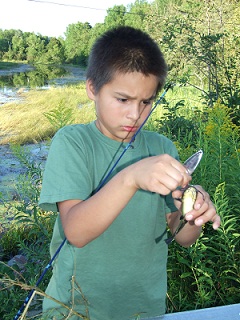
Most of the students in the College of Letters & Science may be away for the summer, but that doesn’t mean the action has stopped on campus. Our faculty and staff are still living out the Wisconsin Idea, both in Madison and all over the world. This is a story in our Summer Snapshots series.
If Jannet Arenas (BSW '12, Social Work) is being honest, she wasn’t sure how last summer would go.
Arenas was set to lead a fishing club for Latino children as part of her environmental studies independent study service-learning course under Tess Arenas (no relation), the Director of the Office of Service Learning and Community-Based Research at the University of Wisconsin-Madison. The Wisconsin Department of Natural Resources was looking to reach minority youth and had contacted Tess Arenas about starting a program.
Enter Jannet Arenas, who worked with her mentor to partner with Centro Hispano of Dane County, a Madison nonprofit, and developed a curriculum in a matter of weeks.
“At first I was a little unsure if we would have participants interested in that,” said Jannet Arenas, who also earned a certificate in Environmental Studies and was a member of the Community Environmental Scholars Program.
Her fears turned out to be unfounded. A year later, what started out as a small club grew into a statewide program that reached more than 140 kids this summer. Fishing in the Neighborhood consisted of five clubs in its second summer, with each being led by students or recent graduates of schools from throughout the state.
But these weren’t just your standard fishing clubs. Each utilized a culturally-specific curriculum developed to reach its target demographic in coordination with a partner agency. The Centro Hispano club, for example, was a bilingual program with an emphasis on environmental justice and college planning.
“When you’re dealing with communities that are marginalized economically and politically, it’s nice to have a program that is more attune to your world view,” said Tess Arenas, who decided to expand the program after seeing the reaction at Centro Hispano’s graduation event last summer.
Finding ‘the cream of the crop’

Arenas found five organizations to partner with, then set about recruiting students to participate in the service-learning project. Jannet Arenas returned at Centro Hispano, along with UW-Milwaukee student Victoria Shanahan, Tess Arenas’ daughter who joined midway through last summer as an assistant.
UW-Madison students Chris Spears and Jessica Alanis led a club at the Urban League of Madison that incorporated the ideas of African American self-sufficiency and establishing role models for college and beyond. UW-Madison student Yesenia Saavedra and recent graduate Beatriz Canas (BA '12 Sociology and Social Welfare) ran a bilingual program through the Boys and Girls Clubs of Madison that stressed multiculturalism.
UW-Madison student Isaiah Vang and Peter Moua of Viterbo College worked with the La Crosse Area Hmong Mutual Assistance Association on a club that incorporated Hmong language, spiritual practices and herbal medicine. And there was even a club on the shores of Lake Superior: UW-Madison student Dylan Jennings and Zach Hartlev, a recent graduate of Lac Courte Oreilles Ojibwa Community College near Hayward, ran a club on the Bad River Indian Reservation in Odanah that emphasized the Ojibwe language.
“Each one of our students has risen to the occasion,” said Tess Arenas, adding that each of the UW-Madison students and graduates involved have track records of activism and community service on and off campus. “… They’re the cream of the crop.”
Teaching more than fishing
Jennings, who is also the president of Wunk Sheek, a Native American student organization, was on the UW-Madison club fishing team as a freshman and has been a lifelong fisherman. But he was just as excited to instill an interest in his tribe’s native language as he was to teaching proper casting techniques. The Bad River club’s curriculum included games and exercises in Ojibwe and Jennings, who’s not fluent in the language but has taken several classes in it, quizzed the kids in Ojibwe after they catch fish.
“If I can get a few more kids interested in taking a class in the future, maybe this class would equip them with the confidence to take another Ojibwe class in college,” said Jennings, a junior majoring in Anthropology and Wildlife Ecology.
Vang had similar goals in La Crosse. In addition to honing the kids’ language skills, he worked with the HMAA to organize meetings with Hmong community elders to allow for intergenerational interaction.

“It’s not an everyday thing that happens for most kids,” said Vang, a senior majoring in Psychology.
Jannet Arenas’ club at Centro Hispano was also able to expand this summer thanks to a grant from the Recreational Boating and Fishing Foundation. The rapid growth of the program as a whole has been staggering for Arenas, who didn’t start fishing until last summer.
“From being an independent study to this big initiative, really, it’s pretty incredible,” she said. “And it’s just really exciting for our kids to have that chance. I can personally relate to the fact that I didn’t have anyone to take me fishing during the summers. And my family didn’t have money to take me to summer camp.
“A lot of our families that are in that situation where if they don’t have an accessible program – a program that’s free, that they know, that is offered in their language … they don’t get a lot of those opportunities.”